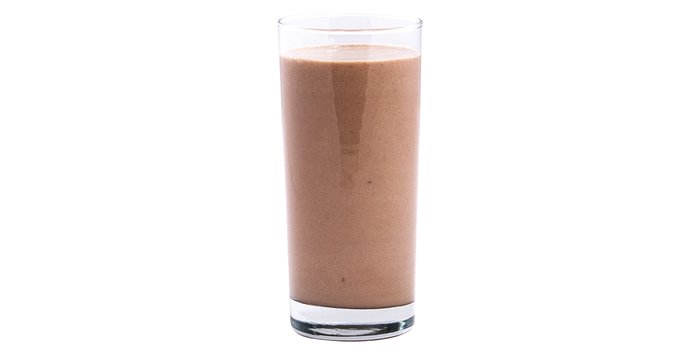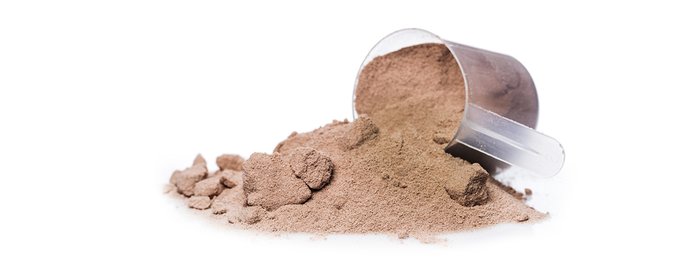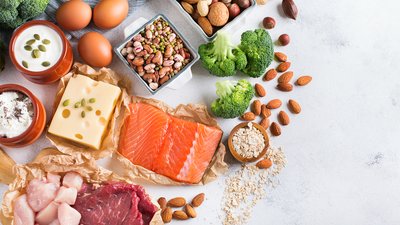Anyone who's been around a gym for more than 30 seconds has probably heard that protein intake is the most critical component of nutrition when it comes to building mass. For some time, the recommended daily allowance (RDA) for protein has been 0.8-1.2 grams of protein per kilogram of body weight. But, the International Society of Sports Nutrition (ISSN) now says that these numbers are low if you're looking for serious gains.[1]
Eat Protein All Day Long
If your goal is to develop greater strength and size, you probably know that you can't just down a protein shake after your workout and call it a day. Your muscles need a continuous stream of amino acids to support muscle protein synthesis, and amino acids are derived from the breakdown of dietary protein.
"The big thing that's changed [in sports nutrition research] is the amount of evidence that the body needs a certain amount of protein all day long to support physical adaptations," says Dr. Lem Taylor, Associate Professor of Exercise Science at the University of Mary Hardin-Baylor, and co-author on the ISSN's updated position.

"Nothing crazy has changed in terms of timing," he says. "The news is that you need to hit optimal feeding windows and dosages all day long to keep positive protein balance and synthesis."
What this means is that you can continue to consume your protein-rich pre-workout and post-workout meals. You just can't load protein right around your workouts and then forget about your eating habits the rest of the day. Instead, your best bet is to divide your daily protein allotment into equal portions and spread them out so you're eating every 3-4 hours to keep the amino acids flowing.
According to the ISSN, the optimal protein intake is around 0.25 grams per kilogram of body weight per meal. Taylor says you can push that number up to 0.4 grams without ill effect. For a 200-pound athlete, that translates to 24-36 grams of protein per meal, or the equivalent of a 4-ounce piece of chicken breast. That's not much chicken per meal, but you will be eating it more times per day.
Consume for Your Body Weight and Goals
You may not know how much protein you need to consume every day. Maybe someone has told you to consume a specific amount of protein per day—say, 140 grams—without basing that on your body weight. If that's how you've determined how much protein you need every day, then you need to revisit that number. As Taylor points out, you'll get the most muscle protein synthesis when you consume the right levels of protein for you—for your specific body weight.
Taylor explains that if you're trying to add mass, you should consume a minimum of 1.6 grams of protein per kilograms of body weight per day. But you don't have to stop there.
"I don't know why someone who's really driven to put on muscle mass wouldn't be eating at least 2 grams per kilogram of body weight per day," he says.
Practically speaking, this means that daily protein needs will vary significantly from person to person. For instance, using the guideline of 2 grams per kilogram of body weight per day, a 150-pound person would need to consume roughly 136 grams of protein per day, while a 250-pound person would need to consume about 226 grams.
Don't Forget to Consume Protein Before Bed
"There's a lot of interesting data out there now on pre-sleep feeding," Taylor says, "which can increase overnight muscle protein synthesis and metabolic rate without influencing or limiting the production of glucose."

Just keep in mind that if you're using supplements to increase muscle growth, stick with casein protein before bed. Casein is broken down more slowly, providing you with a steady, prolonged flow of amino acids, which is ideal for meeting your body's overnight protein needs.
Eat More Protein to Get Lean
Getting lean, particularly if you want to build muscle mass while simultaneously losing fat mass, is a complicated subject. It involves everything from your strength-training program, to how much cardio you're doing, to the specific changes you make to your diet. But, one thing is clear: If you're trying to get lean, increase your protein intake.
"There are some studies out there that show when you're training you can consume 4-5 times as much protein as the original RDA and still not see an increase in adipose tissue," Taylor says. "From a metabolic standpoint, more evidence shows that protein isn't metabolized the same way as fats or carbs. In one study, athletes consumed 4.4 grams of protein per kilogram of body weight per day on a hypercaloric diet without affecting body composition. The study participants consumed a possibly unnecessary level of protein so the researchers could see if it made them gain fat. It didn't."
In another study, athletes in a 4-week study consumed 3.3 grams of protein per kilogram of body weight per day without any negative effects. Participants performed strength training four days a week and interval training six days a week while consuming a low-calorie diet to promote weight loss. One group of participants consumed protein at 1.2 grams per kilogram of body weight per day, while the other group consumed twice as much (2.4 grams).[2]
At the end of the four weeks, the higher-protein group gained an average of 2.5 pounds of lean mass—and lost more fat than the group that consumed less protein. The results suggest that if you want to cut calories and build muscle, shoot for protein consumption in the 2.0-2.4 gram per kilogram of body weight range.[3]
Supplements Can Help
Some people insist that supplements are the only way to get your protein, while others say you have to get them from whole foods. For Taylor, the truth lies somewhere in the middle.

"You can accomplish anything you want with real food," he says, "but sometimes it's easier to mix up some protein powder—especially for larger people who need to consume as much as 250 grams of protein per day. Between ease and affordability, supplements can be a good way to help you reach your goals. They're not the only way, but they can help."
References
- Jäger, R., Kerksick, C. M., Campbell, B. I., Cribb, P. J., Wells, S. D., Skwiat, T. M., ... & Smith-Ryan, A. E. (2017). International Society of Sports Nutrition position stand: protein and exercise. Journal of the International Society of Sports Nutrition, 14(1), 20.
- Antonio, J., Peacock, C. A., Ellerbroek, A., Fromhoff, B., & Silver, T. (2014). The effects of consuming a high protein diet (4.4 g/kg/d) on body composition in resistance-trained individuals. Journal of the International Society of Sports Nutrition, 11(1), 19.
- Antonio, J., Ellerbroek, A., Silver, T., Vargas, L., & Peacock, C. (2016). The effects of a high protein diet on indices of health and body composition–a crossover trial in resistance-trained men. Journal of the International Society of Sports Nutrition, 13(1), 3.

